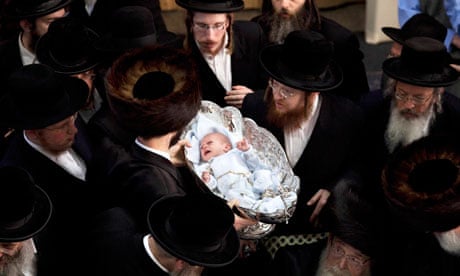Israel's Jewish population has passed the symbolically significant 6 million mark for the first time – equivalent to the number of Jews killed in the Holocaust.
Figures released by the central bureau of statistics this week show the total population of Israel at 7.98 million, 75.4% of whom are Jewish. Just over 20% are Arab and 4% are defined as "other".
"It's a great joy to know there are more than 6 million Jews in Israel," said Dina Porat, chief historian of Yad Vashem, Israel's Holocaust museum and head of the Kantor centre for the study of contemporary European Jewry.
"But worldwide we are still in the same place. Before the Holocaust there were around 18 million Jews in the world; after it, a bit more than 13 million. We are still at a bit more than 13 million. But now Israel's Jewish population is close to half the Jewish nation worldwide. It puts Israel in a very central place. We are almost the only Jewish community that is growing."
Six million was a "significant number", said Anita Shapira, professor of Jewish history at Tel Aviv university. But, she added, "living Jews do not compensate for dead Jews. The number [6 million] symbolises a catastrophe, not a recuperation. We are still paying for the Holocaust."
Avraham Burg, former speaker of the Israeli parliament and author of The Holocaust is Over; We Must Rise From its Ashes, said 6 million was a "symbolic number but random".
"Is Israel any different if it has 5.9 million Jews, or 6.1 million? The answer is no. I don't see the state of Israel as either compensation or revenge for the Holocaust. Israel is a standalone entity. Yes, we have the looming shadow of our history, and the victims of the Holocaust should be cherished and remembered, but it should not define our politics," Burg said.
Israel, he added, "is not a state of 6 million Jews but of almost 8 million citizens". "Each and everyone of us should be equal, regardless of our creed or race."
Separate figures released by the Palestinian Central Bureau of Statistics predicts the number of Arabs in Israel and Palestine will equal the number of Jews by 2016, and exceed it by 2020. There are 5.8 million Palestinians in the West Bank, Gaza, East Jerusalem and Israel, and 11.6 million worldwide, it said.
The Palestinian birth rate was 4.4 in 2009, down from 6.0 in 1997, but higher than the Israeli Jewish birth rate of about 3.0.
This demographic trend is the chief argument put forward by Israeli Jews against a single binational state as a solution to the Israeli-Palestinian conflict. The inevitable Arab majority in such a state would mean the end of Israel as a Jewish state, they say.
The Jewish population of Israel has increased almost tenfold since the state was declared in May 1948, when there were about 660,000 Jewish citizens, according to the Israeli CBS (pdf). At least 700,000 Palestinians – a big majority of the Arab population of Palestine – fled or were forced to leave their homes and land in the 1948 war.
